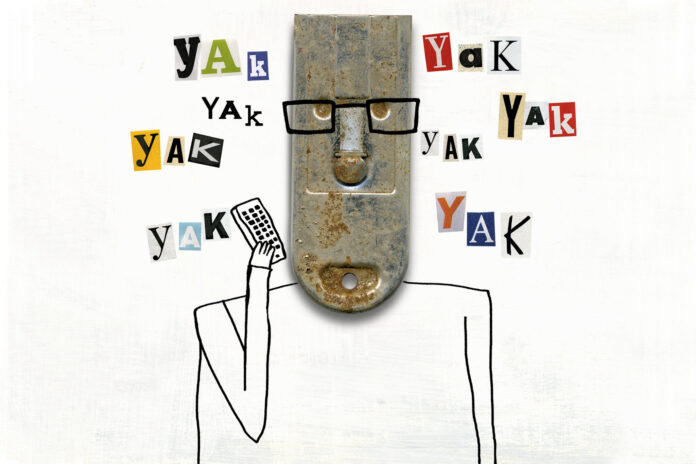By Juan Siliezar
Harvard Staff Writer/The Harvard Gazette
Ever get stuck talking to someone, and you can’t figure out how to get out of it? How about finding yourself in a really interesting conversation but having it end kind of prematurely? You’re not alone, and it’s all because we’re uncoordinated — conversationally, anyway.
A new study looking at 932 conversations between pairs of people finds that most conversations don’t end when the participants want them to. Some feel as if conversations are too short while others think they go on far too long, as many folks are undoubtedly, sometimes painfully, aware. In fact only about 2 percent of conversations ended when both people wanted them to, according to the research.
“A lot of people read this and assume that the finding is that people want to go before it ends because I think that’s the most normal experience that people have,” said Adam Mastroianni, a Ph.D. student from the Harvard Psychology Department who helped lead the study. “A majority of people do say that, but plenty of people say the opposite: that they want it to continue. In fact, if you just look at the average, between the people who want to go [from the conversation] soon and people who want to go later, they actually cancel each other out.”
The work highlights that most conversations end at a time that’s different from what people want, signaling a classic coordination problem that likely happens because people don’t want to seem rude.
“This happens for two reasons. One is that people don’t want to talk for the same amount of time so they have that coordination problem to solve. Two, they don’t know what the other person wants, so however they want to solve that problem, they can’t do it because to do it you need to know what the other person wanted and they would have to know what you wanted,” Mastroianni said. “You don’t abruptly stop talking to somebody and walk away because it’s not kind.”
The study published in the Proceedings of the National Academy of Sciences. Harvard Psychology Professor Daniel Gilbert was one of the study’s other co-authors, along with psychologists from the University of Pennsylvania and University of Virginia.
When it comes to human communication, conversation is essential. Yet, psychologists are only now beginning to study the act itself as opposed to aspects of it of it like persuasion or bias. The researchers here wanted to learn about a basic, but tricky part of conversations — their endings — to see what insights they could offer into fundamental social behavior.
“Humans are the most social animal on the planet and conversation is the bread and butter of social life,” said Gilbert, the Edgar Pierce Professor of Psychology. “We may not live by bread alone, but we die without it. A scientific understanding of conversation — how it starts and unfolds and ends — could hardly be more important.”
Mastroianni was inspired by parties he had to attend (pre-COVID) where he worried he would got stuck in conversations he couldn’t get out of politely. He wondered: What if both people in a conversation felt like hostages?
The team conducted two smaller studies within the larger one to flesh out the differences between how long conversations lasted and how long people wanted them to last before wrapping things up.
In one part of the study, researchers brought in 252 strangers. The participants were divided and told to talk about anything for at least a minute and up to 45 minutes.
Almost 69 percent reported a point where they felt ready for the conversation to end while about 31 percent reported not having that feeling. On average, the participants wanted the conversation to be almost a minute longer than it actually was.
In all, only about 2 percent of conversations ended when both parties wanted them to and only 30 percent of conversations ended when at least one of the people wanted them to. In about 46 percent of conversations both parties reported wanting the conversations to end before they did, while in only 10 percent of conversations both said they had wanted it to last longer than it did even though one of them chose to end it.
Researchers suggest these discrepancies came down to not knowing when the other person wanted to cut the chatter, and both people hiding their intentions in order to be polite. Participants, for example, misestimated how long their partner wanted the conversation to last by about 64 percent.
“It’s not just that people want different things; it’s also that they really don’t know what the other person wants,” he said.
The other part of the study looked at conversations between people who knew each other. Just over 800 participants completed online surveys regarding their most recent conversation and how long it lasted. Most of the conversations were with a spouse, family member, or friend.
About 66 percent found there was a point during the conversation when they felt ready for it to end and, on average, participants wished their conversations lasted almost two minutes longer. They also felt their conversation partners wanted to keep talking almost six to eight minutes longer than the conversation actually was. Both numbers suggested neither party got the conversation length they were looking for.
The researchers plan more work looking at one of the most essential pieces of social connection, including expanding this study to look at people talking in groups.
(Reprinted with permission from the Harvard Gazette.)
















